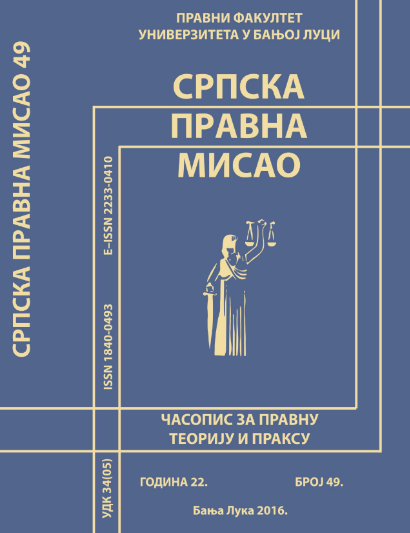ACQUISITION OF PROPERTY BY MAINTENANCE (USUCAPIO)
DOI:
https://doi.org/10.7251/SPM162249010CAbstract
The topic of the work is the acquisition of property by the original means, ie. I will hold, with a brief overview of the historical origin and development of the aforementioned institute, but also its positive - legal and regulation in comparative law. The issues of legal and illegal statehood, conscientious and unscrupulous statehood, real and flawed statehood were analyzed, bearing in mind that the conditions for acquiring statehood are related to its quality. Also, the terms required for the creation of maintenance, the effect of registration were considered property acquired by maintenance in the public real estate register, as well as the connection between maintenance and service. Maintenance (maturity, usucapio) represents the original way of acquiring property rights based on state property, which fulfills the prescribed conditions related to its properties (qualified, usucapio state property) and which lasted for a period determined by law. In today's law, there are two forms of maintenance, regular and extraordinary, with their specificities related to the qualified (usukapion) state and the passage of time. Acquiring property rights through regular maintenance requires a qualified state and the passage of time. Qualified is the state that is at the same time legal, conscientious and right (not flawed). Unlike regular maintenance, where the state has the highest degree of qualification, extraordinary maintenance is characterized by a lower qualification of the state but also longer terms (it is enough for the state to be conscientious, legality is not sought). The significance of the institute of preservation in law is not limited only to the acquisition of property over things, but its effect extends to another area, which is very current in legal transactions. Namely, with maintenance, officialdom can be acquired by fulfilling certain conditions related to statehood (actual realization of officialdom) and term (passage of time).
Downloads
Published
Issue
Section
License

This work is licensed under a Creative Commons Attribution-NonCommercial-NoDerivatives 4.0 International License.



